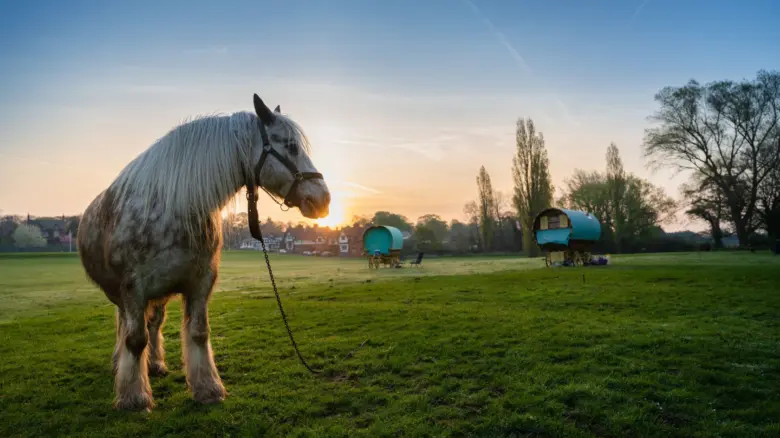
“I wanted to improve outcomes for the people I was supporting”
I had witnessed some very poor practice towards Gypsies and Travellers from some Social Workers.
In honour of Gypsy Roma and Traveller History Month, Director of Safeguarding Jackie Bolton, discusses her experiences as being one of the only Social Workers from the Traveller community; and what we can do to educate ourselves to better support one of Britain’s most marginalised ethnic groups.
My ancestors are a mix of Travelling show people, Romanies, London Costermongers and settled farm workers. I grew up travelling with my extended family around London and the home counties.
I am glad there’s a month which recognises and celebrates the existence and contribution of Gypsies, Roma and Travellers. Its estimated there are around 300,000 of us in the UK but very little is heard about us that is positive or affirming. It’s been said we might be Britain’s oldest ethnic minority, with records first mentioning Gypsies arriving in Scotland in 1502.
With all the negative stories in the media, unrepresentative documentaries which stereotyped Travellers and the prejudice we experience, it can be quite difficult to stay upbeat. This month of June, when we traditionally went out picking strawberries and to the big fairs, is our big chance to try and overcome that negativity and be loud and proud of our rich heritage.
I had witnessed some very poor practice towards Gypsies and Travellers from some Social Workers.
I started working in the charity sector in 2003, having taking voluntary redundancy from a 20 year career in business. I used the skills I’d gained during my career and my personal knowledge of the communities, to set up and run an advocacy service for Gypsies and Travellers for a children’s charity in the East of England.
However, I felt my lack of formal qualifications was holding me back. I was inspired by my younger sister who had just gained a PhD and the brilliant role models including my Head of Department and some student social workers I had supervised, to start formally training as a Social Worker.
I had also witnessed some very poor practice towards Gypsies and Travellers from some Social Workers. They’d displayed an appalling lack of knowledge, which I thought I could influence by qualifying myself. I wanted to improve outcomes for the people I was supporting and felt the qualification would help me achieve this.
There are a few of us trying to make changes from within the profession
In general the experiences that most Travellers have with statutory services such as the Police and Local Authorities is negative. This includes interactions with Social Workers, where the contact is usually due to child protection investigations. In these cases any assessments and decisions risk being informed by negative media coverage, due to lack of real knowledge about the communities or an evidence base to refer to.
Historically Traveller children have been systematically removed from their birth families in efforts to promote assimilation, so the fear does have grounding. This fear of Social Workers can be misinterpreted as non-cooperation, which further compounds the problems. My own mother was visited by social workers when my sister and I were born to check the caravan was ‘fit for human habitation’. For anyone who has visited a Gypsy caravan you will know you could eat your dinner off the floor, so this is a humiliating experience for most women.
For these reasons not many Travellers decide to become Social Workers, but there are a few of us trying to make changes from within the profession and contribute to improving practice not just for Travellers, but other marginalised people who professionals often make assumptions about.
I myself have experienced prejudice and stereotyping when on placement and working in Social Care. Where I have seen colleagues making assumptions regarding Travellers on their case-loads I have challenged them.

My family has a saying which is ‘never judge a pie by its crust’, so I was brought up to never make assumptions about people and to treat everyone equally. I guess it’s what we wanted for ourselves. We were so frequently judged by the people we met, whether for living in caravans, for moving around, for stopping in a layby, for not reading and writing, for talking with a certain accent or just being different to the settled people.
I try to put this non-judgemental approach into my work, through anti-racist and anti-oppressive practice, encouraging staff to consider the cultural needs of people using our services and also in recruitment.
I believe a diverse workforce makes for a richer, stronger team because we all bring our different perspectives to the challenges we face and can generate much more creative solutions. Of course I am not perfect and can always learn, so I welcome the guidance and insight that others can bring from their experiences.
Further Information & Resources
Watch this short film to learn more about Gypsy Roma and Traveller History Month
Tips and guidance on good practice working with Gypsy and Traveller communities.
Social Work with Gypsy, Roma and Traveller Children by Daniel Allen & Paul Adams
A guide for professionals working with Gypsies, Roma and Travellers in Children’s Services
Support available for the Gypsy, Roma and Traveller community during the coronavirus pandemic
Discover opportunities to work with Safer London
CLICK HERE